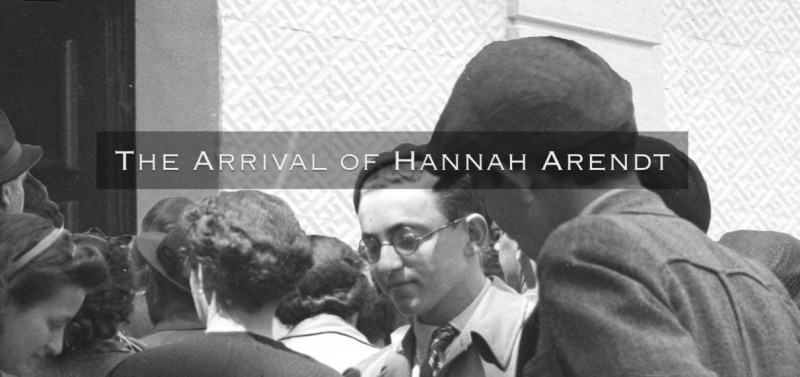
The Arrival of Hannah Arendt
This film describes the arrival of Hannah Arendt - a Jewish, German-American political theorist and publicist - in New York and her reflections on flight and helping people start over.
4. Dezember 1944
Ich habe ja mein Examen als „Nurse“ gemacht. Einmal wollte ich beweisen, daß ich dazu qualifiziert bin (trotzdem ich drüben, wie eine sagte, doch NUR EIN DOKTOR war!), auch zu dem Unterricht, den ich den Frauen noch immer erteile, zum dritten – ich wollte DEN Fetzen Papier, als meine Lebensversicherung, wie ich lachend sagte, denn ich habe erkannt, daß alle Kenntnisse, alles Wissen hier keinen Wert haben, wenn man nicht ein American Certificate hat!
I took my exam as a nurse. Once I wanted to prove that I am qualified to do so (although over there, as one said, I was ONLY A DOCTOR!), also to the lessons I still give to the women, thirdly – I wanted THE scrap of paper, as my life insurance, as I laughingly said, because I realized that all knowledge, all knowledge here has no value if you don’t have an American Certificate!
Hertha Nathorff, née Einstein (1895-1993) was a German pediatrician, psychotherapist and social worker, she published several works, including a book of poems. She was born in Laupheim (Baden-Württemberg) into a Jewish family. She was related to the physicist Albert Einstein, the musicologist and music critic Alfred Einstein, and the film producer Carl Laemmle. Nathorff attended high school in Ulm and, interrupted by a temporary job as a nurse during World War I, studied medicine in Munich, Heidelberg, Freiburg (Breisgau) and Berlin from 1914. After receiving her doctorate degree in Heidelberg (1920) and years as an assistant in Freiburg, she was a senior physician at the Red Cross Women’s and Children’s Home in Berlin-Lichtenberg from 1923-28, then worked in private practice and simultaneously at the Charlottenburg Hospital as head of the family and marriage counseling center. In the course of National Socialist racial policies, she lost her medical license in the fall of 1938, while her husband, formerly a senior hospital doctor in Berlin-Moabit, was granted a license for exclusively Jewish patients. During this period she worked as his receptionist.
Threatened with death in Nazi Germany, she organized emigration with the help of American relatives from November 1938, sending her 14-year-old son ahead to England on a Kindertransport. In April 1939 the couple managed to leave the country for London, and in early 1940 they continued their journey to New York. In New York she worked as a nurse, maid, bar pianist and kitchen help to support the family. She remained a physician’s assistant in her husband’s practice, which opened in 1942 – she did not have the time to get her degree recognized.
Hertha Nathorff took a very active part in the social life of the German-speaking exile community: she organized courses for emigrants in nursing and infant care and cultural events, was the founder of the Open House for the elderly, chairwoman of the women’s group, and an honorary member of the presidium of the New World Club. In the excerpts from the diary of Hertha Nathorff Berlin-New York Aufzeichnungen 1933 bis 1945, which we show in our archive, the author deals with her initial problems, disappointments and mortifications in the New World. She reports on the everyday life of emigrants, on the struggle for existence, on poverty and mental destruction. Despite her longing for the places of her childhood and youth, she never visited Germany again. She never really settled in America. The homesickness remained constant.
Excerpt from the diary of Hertha Nathorff, edited and introduced by Wolfgang Benz (1987): Das Tagebuch der Hertha Nathorff. Berlin – New York. Aufzeichnungen 1933 bis 1945. Schriftenreihe der Vierteljahrshefte für Zeitgeschichte, Band 54. R. Oldenbourg Verlag München, p. 209.
Translation from German to English © Minor Kontor / We Refugees Archive.